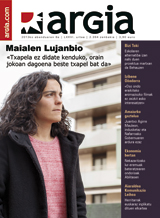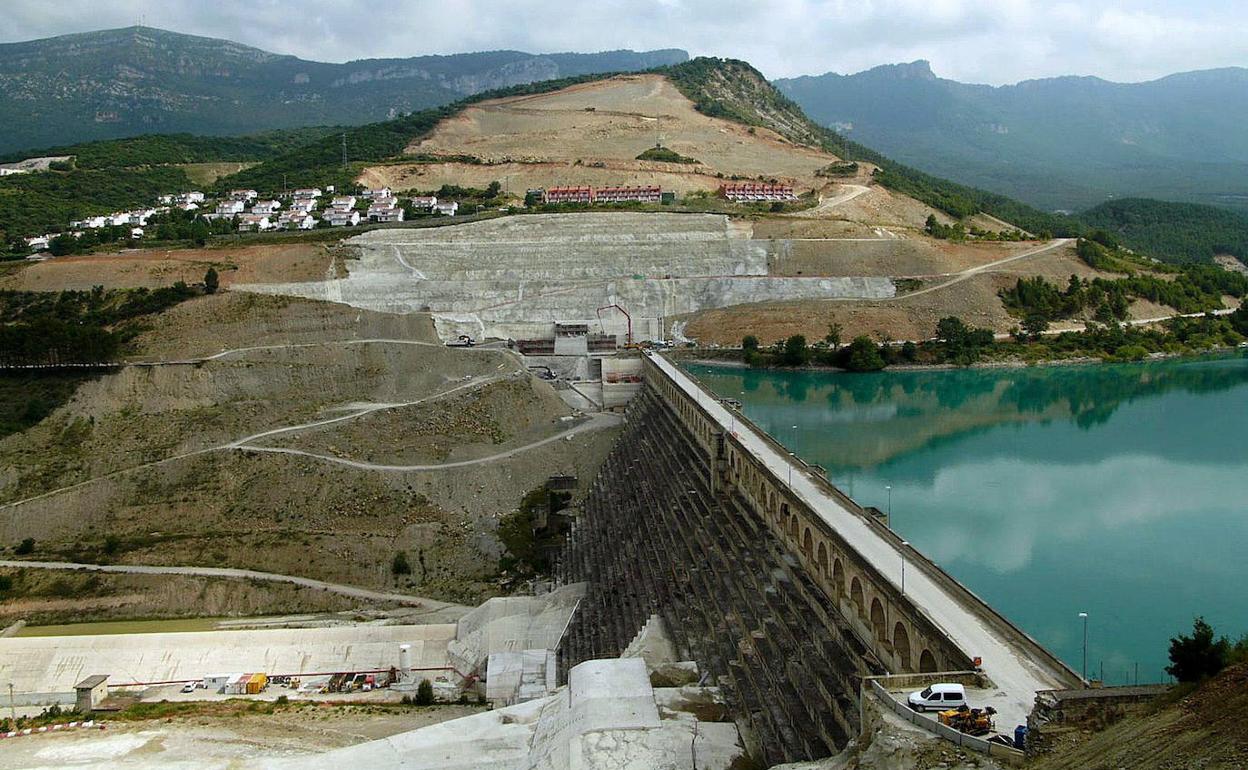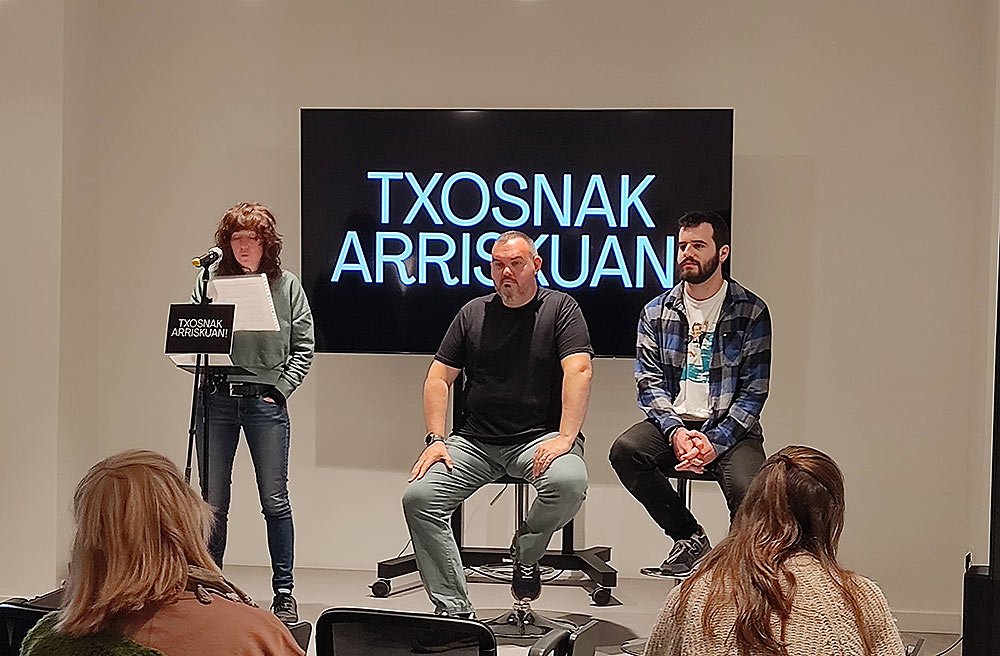"The txapela I'm not tattooed, it's a matter of style"
- After knowing the names of the eight classified for BEC, the main question is in the air: What will be given on stage by the champion who has followed the championship since the shadow. In the middle of the Remanso, we've talked about the Bertso.

You've seen in the town sessions the bertsolaris now showing up in the Championship. Did you get any surprise?
Moving from the summer march to the preparation of the championship is also traumatic for the bertsolaris. Because the championship is another bertso. Almost another gender. It's done differently, people expect something else, everyone wants to give something else, the focus is put in other places -- when it's made public, it's hard to see our peers so tight, so stiff and so tied. But you empathize because you imagine there so tied and making such a showy bertso, so as not to make mistakes. Above all in the early stages, as the concern of the bertsolaris is that they pass at least the first stage, to have a second chance. This link is seen in attitudes and verses. As the phases advance, there is more welt and more normality.
Most bertsolaris I know them on stage. But from the outside, I've realized that an Unai Agirre has left the impression on people's heads. Or Agin Laburu, who people didn't expect. Or the Bertso of Odei Barroso that people feel very sweet and comfortable. Or Nerea Elustondo also made a great effort and stayed with the will of the people. Maybe I'm not so amazed that I know you. But some have stayed at the head of the general public.
Familiar faces have been left out. Do you have an expensive price for bertsolaris?
Before we start the championship, we already know what's at stake, the risks it has. If you take out a good championship, it's a big prize, that welcoming of the people, the success there is not in the plazas, both media and a huge dose of applause -- but it also has the other side, the risk of falling over the thread. At the moment we are there in the whirlwind and it seems that it is vital and that is the most important thing in the world; then you have to see it with distance and relativise it.
In Bertsolarism, the championship is usually a milestone, but it is not the base. Let us not be dismissed. The most spectacular are the championships, but the base and the really important thing are the weekend programs. The humility of the championship and the joys and sorrows of the championship are fine, but with time, fortunately, they are relativized and the session of Zeanuri, that of Aniz, that of Bilbao, will come... they are the ones that really maintain Bertsolarism a year.
The bertsos he has chanted for bertsolari can be his treasure. What weight do the verses of the square and those of the competition have in your treasure?
Otherwise they are kept. In the championship there are many cameras, many eyes and ears placed on the verses and verses are taken as pieces of a limited number of painters. It's as if we focus a lot more on those pieces, there's more to memory, there's more to it, there's more to it, there's more to it, there's more to it. In the squares the bertsos are not such limited serial works, among many bertsos it is easier to pass. But they have another value. The verse of the plaza has much more to do with the place and the moment. It's been an amazing pearl in that place and in that moment. It can be more or less worth as a piece, but the explosion that generated that moment by joining cannot be compared to anything else. The parts of the plazas are pieces to measure differently. It happened in that place and in that moment, under certain conditions, responding to a given situation, following a specific word... that will not happen again. That's the value of the verse.
The championship has spread to less Basque areas. You have been in the squares for many years, how do you see the situation of the Basque Country in your daily life?
The Association has made a determined and interesting commitment to work territoriality also through the sessions. The championship is dedicated to territoriality, we should not wake up again, and the function of the championship is not just to decide which is the best bertsolari. The most interested are their side effects. What is most interesting is the impact of holding the final in Barakaldo and the creation of a bertsolaris school, as it has done. This is one of the key functions. This year, for example, having sessions in Oion, Murgia or Maule is ideologically nice as an approach. Great asterisk. We must also sacrifice some places that can be more powerful, with greater accessibility to the public, more economically profitable... The structural situation
of the Basque country varies a lot from one place to another. Whether it's legal or not -- Bertsolarism leaves a little leash in those places: it's not just that day's work, it's already done a previous job at the Euskaltegis, at the ikastolas, and with that and with that number of people passing the day, we're waiting for them to leave a mark. To their extent, it can leave a nice effect.
Is bertsolari being asked to do the same in the Basque and non-Basque areas?
The least difference is noted in the championships. The championship is usually quite neutral, it's something nationwide and it hasn't mattered so much whether it's been in Maule or in San Sebastian. The socio-linguistic situation of each people is very noticeable at the weekend sessions. There is a difference between singing in Pamplona or in Asteasu, Durango or Gasteiz. The sophistication or strength of the verse itself is more appreciated in the very Euskaldunes and bertsolarism buffs. Usually, bertsolarism may have another function in less vascophonous areas. Maybe people ask for something else from bertsolari: the session is usually more juicy, more dialectic, more content-focused, less valuable for form -- but people are also educated.
In all these years of the plaza have you detected that the Basque country has developed qualitatively?
I think yes, a language has been socialized with the press, with television, with radio... it has been standardized, there are common references and the current song touches a lot on detail and concrete words and people like that. Perhaps the words have multiplied and the expressions have decreased ... The old verse rimmed with the verbs, with four words of rhyme making ten thousand verses. There you have to develop your skills to say things differently. The language we use today is different. And written culture has also had a lot of influence on improvisation. The rhymes come together more by the eyes than by the ears. Many times, “this and this is rima?” Who sends, written? How do you get into your ear? That's why I say rimas are also often visual. That the letter has, in part, occupied its place in the mouth, in the eyes in the ear. If, before, orality was a daily fun, today visual and written culture predominates, it is normal that influence has occurred.
Maialen 4 years ago and this one. The 2001 championship was a milestone in your Bertsolaris. Is the evolution of that, or what have you noticed?
Then, that effort of narration and description on individual subjects (that of the Himalayan letter, which started “Hello Maialen how”) did not have it previously theorized, although more or less intuitively I knew what I wanted. It is a later reading of Bertsolarism. The championship is usually interesting to check what's being done for yourself. To stay and make a reading. Evolution in itself is or should be constant in all areas of creation. The competition serves as an excuse to stay, think, review... I'd like to think that I've evolved something since 2001. One more year I remain in that constant endeavour to innovate. The changes are not huge, from one end to the other. But they look at it with a time perspective. I find it difficult to tell you what is going to be this year. I have an intuition, I know where I want to go.
Form and content must go together. We have a space to work from the linguistic point of view, in expressions, in those laps to say things. I started by beautifying it in verse and then I wanted to desiccate it. I'm on that path.
My goal would be to tell you. Talk about things about our environment. Don't dance on the void. There are issues of interest to me.
Champion for four years. How did you take her?
In these four years, I haven't been thinking every day that I was a champion. I'm not tattooed. There are moments and compromises in which you are responsible, the person who occupies this symbolic place is you. But fortunately in my life and in my Bertsolaris, nothing has changed much, it's been quite normal. For me, the key was the 2001 championship: when I focused on Bertsolarism, I believed and put myself “here I am and here I want to be”. Feeling that your word is more heard... For so many years, I'm not going to make more places for the txapela, I'm not going to go to more compromises... On my way, the 2009 was not a revolution. The feeling of concern was something that preceded it.
I enjoyed that achievement right now. Then it was only a four-year old ecstasy. I've been very quiet. I've lived it very shared with my generation. I have lived it this way, I have not felt an outstanding figure. If I have reached Bertsolaris to this day, it has been largely by the group. So I've been carrying the txapela for four years.
Women and power is a subject. It may be hard for us to be in that place. Maybe it has something to do with that being a woman. Some have told me that “you don’t see a champion in you.” It is also a matter of style, I do not underline it. Or maybe fear? You can have it both. Not wanting to underline can be a fear or even a desire to live things differently. The figure of the champions is also linked to generations. They compare me to Andoni Egaña. Egaña has been a champion in twenty years, but he has also been a champion with a generation that is between 10 and 15 years younger than himself. My case is different. Unai Iturriaga, Igor Elortza, Jon Maia, Jexux Mari Irazu... along with them I feel another, despite being a champion. I don't feel the leader or the reference of anything, not just me. I feel part of an environment. Yes, I assume my place, the importance and symbolism of that place. I tried to be where I should be. But I've also tried not to be everywhere, because when I wasn't in sight, I don't like it.
Are you going to defend your txapela this year?
I don't feel I'm going to defend myself. In the end, that txapela doesn't take me off; now what's at stake is another one. So far it has been felt that we are going to defend the symbolic position, I, however paradoxical it may be, feel that I have nothing to lose. In this case I can lose my symbolic place, I admit, but otherwise you cannot lose it in the championship. The only way to lose it would be to make a big mess. To get lost would be not to achieve the goals you have set. Whether or not you do a good performance txapela is something else. That's not losing, that's not winning.
What do you do if the day of the final the boss doesn't work the way you'd like?
Despite having tried scientifically every year, the situation there is different. It's hard to calculate. The scenario is different, the microphone is different, the rituals are different.
You have to trust that after so many years a verse has not gone well, but the next one can go well. A thousand times you've done it. You haven't suddenly forgotten Bertsolarism. That's attitude. A program can go wrong, and it probably goes wrong, but the next one can go right. And it will come out, if there are so many people watching. Bertso has a good thing: you can't speculate. You can’t calculate “here I’ll lower the tension and here I’ll squeeze it”… I at least can’t, I always do what I can. It is very clear what needs to be done: going and doing. How's the head going to be next? The head does a great job, but we're going to resist. We have passed endings of all kinds: good, bad and mediocre. I have a sample and I'll know how to be.
What would the ideal day of your ending look like?
A nice finish. My body is tense, tense but not subject. A day when I have a great flow in my head. A day that combined the hardness of creation with the pleasure of the day. He who has the ability to realize what's out there. That's the ideal. Many times we get into our work, but if we get it right in that combination, it would be beautiful.
Bertsolaris sing many times about the utopian society they would like. Other times the misery of reality. What's the way?
There is usually a conflict within oneself. On the one hand, it is up to anyone who has the microphone to take responsibility for what it says; to realize what we say. We can have some sort of “social function,” in part. Sometimes you feel in some way the desire to be “pedagogical”, to express what I would ideally like.
Also, as a
public, we are sometimes very politically nice, and we want to hear what we would like it to be, not what we are so politically. It also has a function, to see a destination, to point out that ideal. Bertsolari then remains as a very sensitive and avant-garde person. And bertsolari wants him to be loved by the public. There is a tendency to sing in those reasons, ways of life and beautiful and utopian behaviors. To what extent do people want you and to what extent is it because you have a function and would like that issue to look like this? It can be both.
On the other
hand, it has also been chosen to bring out that miserable reality, less poetic, not so beautiful, and a very interesting option, is to criticize it, and to tell the listener what he often does not want to hear. It's closer to our reality. It's an awkward one, it's not as successful on many occasions, but it may be more interesting. In this option we move to address a topic: What audience is there, what we mean, we want to please, we want to disturb ... For example, if you have a microphone, to what extent do you have to be pessimistic about the social-political situation if there are a thousand people listening? You question all of them. I'm maybe pessimistic, but is it up to me to open a bad roll of the micro? Bertsolari has in his head all those things in the balance. You have to choose very quickly, but you value all of them.
Same as with gender: Are we looking for a society that doesn't tell whether you're a woman or a man, but you have to mark it to better reflect reality?
It's likely to be a process to give. First you go to that ideal that we would like and then you say: I have to come here, but going through many contradictions and reflections. It's a new land. Many times we want to go a long way, but we need to get there after we've walked everything else, not jump from scratch to there. Pompous speeches that are unfounded will not last long. It is interesting that the debate is there. We don't stop questioning ourselves, and that helps us move forward.
The issue of gender is in the world of bertso. Do you think things have changed?
It's a really interesting time, there's a lot of people working on it. Bertso is a good context to work on the issue of gender. People are sensitive, we talk about argumentation all the time, about dialectics, about reasoning. That's why every subject touches us all the time, and so does gender. Many young girls sing berty and, in addition, are very good. It takes time to see what happens to a woman. I think she's just been the only woman. And that woman's call, too. Finally, it needs a lot of women, different and very good. So let's feel what's going on today, that in one session there are two girls, or three or four. It takes time and quantity to do this, so that this is really an interesting and real balance. A few years ago, not many of us would think that nowadays I could be at this point, apply the gender perspective in the sessions, in the themes… From here to a few years it will be seen if we have made that qualitative leap, or if we follow it only at a symbolic level. I guess yes, it's going to take a leap, it's taking.
The other thing is that we are part of society, we have our mental inertia, we have our shapes silenced. The head betrays us many times, we have a very done mood, we have a very done record… Many times we take ourselves, then thinking about something we don’t like. There is a lot to do: As arketype the female images are very reduced… There are enough to do the work, but we have to go quiet to work things very well, not very quickly. Do not give a speech to stay very good in hypocrisy, which then has no background. You have to go slowly, everyone has to do the personal work. However, we can be satisfied with what we are doing.
BRN + Neighborhood and Sain Mountain + Odei + Monsieur le crepe and Muxker
What: The harvest party.
When: May 2nd.
In which: In the Bilborock Room.
---------------------------------------------------------
The seeds sown need water, light and time to germinate. Nature has... [+]























